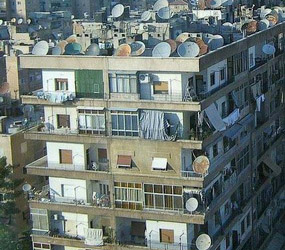
September 06-13
Iranian state broadcasting says 42 percent of Iranians watch television channels that are not part of state broadcasting.
It was an extraordinary admission by the official broadcaster that many Iranians do not like the official broadcasts.
Many Iranians, however, think the vast majority of Iranians, not just 42 percent, watch banned television stations and see the state broadcaster’s “admission” as an effort to cover up the real scale of its problem.
Under Iranian law, radio and television broadcasting is a state monopoly. No private stations are allowed. Furthermore, dish receivers used to pull in foreign broadcasts from satellites are illegal. Such dishes are frequently confiscated and the owners fined.
The 42 percent figure was released by the research department of Islamic Republic of Iran Broadcasting (IRIB), in what the daily 7 Sobh said was a rare admission of the popularity of foreign satellite channels in Iran.
The report said 42 percent of Iranians spend at least three hours a week watching these channels, which air movies, music, soap operas and other entertainment programs as well as news that commonly contradicts the official line. The percentage would presumably be higher if those who watched less than three hours a week were included.
The forbidden channels include the BBC’s Persian service, the Voice of America, Radio Farda, which is funded by the US government, and dozens of anti-regime private stations based largely in Los Angeles.
Two years ago, the Culture Ministry said here were 120 foreign-based television stations broadcasting into Iran in Farsi. It said that 30 new non-political stations had recently started broadcasting “vulgar” movies and television series into Iran, targeting the morals and ethical values of Iranian society. The regime focuses its criticism on immoral entertainment shows rather than news programs.
For more than two decades, the authorities have carried out periodic seizures of satellite dish receivers. As a candidate, President Rohani was critical of such crackdowns, calling them a “violation of personal privacy” and a failed attempt to prevent Iranians from connecting to the outside world.
But the ban on satellite dishes was put on the statute books by the Majlis and enforcement is in the hands of the police who are under the command of the Supreme Leader, not the president.
The daily 7 Sobh said the state broadcasting budget for the current Iranian year stands at the equivalent of $420 million.





















